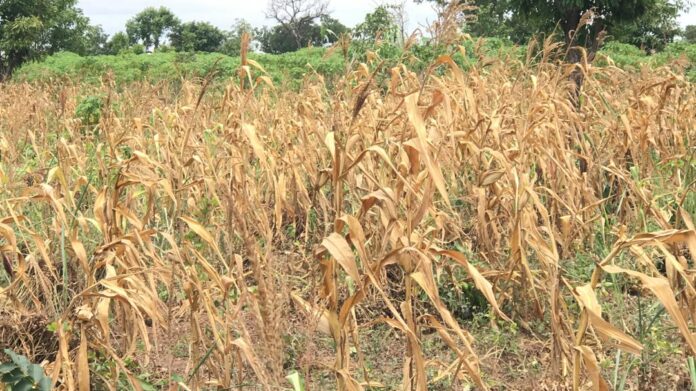Climate change has severely impacted Ghana’s agricultural sector, which is crucial for the country’s economy and food security.
Rising temperatures, changing rainfall patterns, and the increased frequency of extreme weather events have reduced crop yields, particularly for maize, rice, and groundnuts, affecting food availability and farmers’ livelihoods.
In response to an ongoing dry spell severely affecting the Northern regions, the Government of Ghana has imposed an immediate ban on the export of key grains, including rice, corn, and soy.
This move aims to avert a potential food shortage caused by drought-induced crop failures.
The Minister of Food and Agriculture, Bryan Acheampong, announced the decision during a press briefing in Accra on Monday, August 26.
The affected regions, primarily in the north, are responsible for about 62% of Ghana’s grain production. The lack of rain over the past two months has raised concerns about a significant shortfall in grain availability.
This decision follows alarming reports revealing that 435,872 farmers have already lost an estimated GH₵ 3.5 billion in investments due to prolonged dry conditions.
Southern Ghana has also been hit hard by the impact of climate change. The region’s rainfall has become increasingly erratic over the past three decades. Some informed predictions warn of a major prolonged drought that could surpass the severity of the 1982-1983 drought.
Climate change has drastically reduced Southern Ghana’s dual rainy seasons to just a couple of months each year, leaving 6 to 8 months with scant or no precipitation.
The Northern Belt is also experiencing shrinking rainfall duration, though it often records higher annual totals due to concentrated, incessant rains.
However, too much rain in a short period leads to the destruction of crops, property, and even some infant livestock.
The impact of climate change has caused water scarcity, leading to changes in rainfall patterns, droughts, and floods, which are affecting crop growth and livestock production. These changes are also shifting growing seasons due to warmer temperatures, disrupting traditional farming practices.
By addressing these challenges and adopting climate-resilient strategies, Ghana can ensure food security, support rural development, and contribute to global efforts to combat climate change.
Initiatives:
- Climate-Smart Agriculture: Promoting practices like conservation agriculture and agroforestry.
- Irrigation Development: Improving access to irrigation facilities.
- Climate-Resilient Seeds: Introducing drought-tolerant and disease-resistant crop varieties.
- Farmer Training: Enhancing knowledge on climate change adaptation and mitigation strategies.
- Weather Insurance: Implementing insurance schemes to protect farmers against climate-related losses.
Recommendations:
To mitigate these impacts, Ghana’s agricultural sector needs to adopt climate-resilient practices, such as sustainable farming techniques, conservation agriculture, agroforestry, and integrated pest management. The government must promote climate-smart agriculture by introducing drought-tolerant crop varieties, improving irrigation management, and implementing weather insurance.
Increased awareness and education on climate change impacts and adaptation strategies are essential, along with improving access to climate-resilient inputs and technologies, enhancing extension services and support for farmers, and promoting agro-insurance and climate risk management.
Conclusion:
Ghanaian farmers face significant challenges due to climate change, but initiatives are underway to enhance preparedness. Increased awareness, access to resources, and support services are crucial for building resilience and ensuring food security.
The writer, Shadrach Assan is the Producer of Adom FM’s morning show Dwaso Nsem.
You can reach out to him on assanandassan@gmail.com


